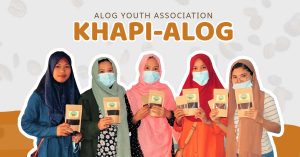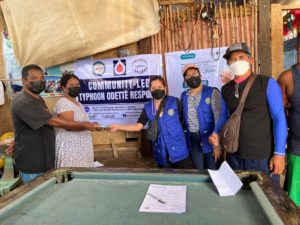Capturing learning from a Typhoon Odette Community-led Humanitarian Action

Sitio Quarry, Barangay San Antonio, Libjo, Dinagat Islands
Libjo is a fifth-class municipality in the Province of Dinagat Islands. It is located in a cove off Surigao Strait that forms a wide, natural harbor, making it an ideal fishing village. From the sea, Libjo looks every inch the potential tourist haven that people here dream it to be. Houses are built on hill tops above the sea. If these were painted in white and made of stones or concrete, this could be mistaken for a Mediterranean or Aegean destination such as Santorini.
But the houses now are mostly made of blue tarpaulins, streets are filled with debris, and the people are still poor, trying the survive the impact of Typhoon Rai/Odette which made landfall here on December 16, 2021. The poverty incidence in this town was already high to begin with – 38.5% of the 18,000 population lived below poverty line. Crippled by two years of the pandemic that limited their fishing business and devastated by Odette, that figure could be higher now. Fishing vessels are lost in the sea, and farms have yet to recover.
It is thus very understandable that the survival needs were the first priority in the Sitio Quarry, Barangay San Antonio where ECOWEB started an experimental approach in aid called Community Led Response. But under the leadership of a skilled and committed woman, the project evolved from relief to recovery. This is a very entrepreneurial CLR, and something that we all can learn from.
Daisy Mae Lafuente is a resident of this Purok 6 Quarry. Daisy is proof that CLR works best if there are leaders who understand the principle, have the trust of the community, and possess an impeccable record of honesty.
She began with a clear articulation of their gratitude to ECOWEB and Help Germany.
“Life here was very simple. Around 80 percent of the families are mostly into fishing with their own banca. The rest are employed by Libjo Mining Corporation, which produced nickel. But Odette destroyed everything. It was the worst experience we ever had. In Purok Quarry alone, around 20 of the 110 families are totally damaged. We would not have recovered without ECOWEB and Help Germany.”
She told the story of their bayanihan. The first aid came four days after landfall. So, people helped each other by sharing what they had stored at home. Ecoweb is the first agency that helped Purok Quarry. It was often overlooked by aid organizations because San Antonio has a very large population, and aid agencies often back out from that kind of reach.
“Help Germany donated cash. And we were trained and helped in planning what to do with it. Our needs at that time were really our survival needs. Within two months after landfall, families received a total 30 kilos per family for three months (much lower than the humanitarian standard of 50 kilos per family per month).”
But we decided to spend half of the P125,000 to start a small business. We support our fisherfolk by letting them get gasoline on credit from a partner business station, thus supporting their livelihoods while earning from the profit.
They divided the amount into two – rechargeable lamps so that fisherfolks can go fishing right away, and then investment in gasoline business. The income goes to the organization, which will allow them to grow their business. The protocols and policies are clear – documentation, credit limits and etc.
Daisy can enumerate the advantages of the CLR. Among others, it lifts their hopes. “We feel we are not abandoned. People care for us, and we are given the freedom to decided what to do with the cash assistance. We are treated like mature and competent people.”
She mentioned that the project helped them understand how to assess vulnerabilities, how to budget, how to document their purchasing, and how to help each other recover. “We even have a regular session for our growth, including training, leadership skills, value formation, with the help of our coach, Principal Nora Balili. It would have been very different if we were not coached by Ma’am Nora.”
But Daisy had articulated the gap in their present activities. She knows ECOWEB has an environmental advocacy, and she shares this perspective. She explained the direct relation between Climate Change and supertyphoons. She knows the struggles of the mining industry.
Libjo Mining Corporation, which employed her husband, was ordered for closure by then Environmental Secretary Gina Lopez for failure to comply with environmental clearance. The finding includes destruction of the watershed area and siltation of the bay. It was questioned in the court, and eventually it reopened.
“LMC helps us in many ways,” Daisy acknowledges. She also thinks waste management is a big issue now, with the dumpsite located in her Purok, causing the sudden proliferation of flies. “So many things to do, but we start slowly.”
Today, they have a cash on hand of 4,215 pesos, an impressive amount for a group that just started a month earlier.
So, what are your long-term plans? She enumerated several ideas, but, like any good CLR, she ended by saying, “But all of that depends on what the community wants. We will meet again.”



